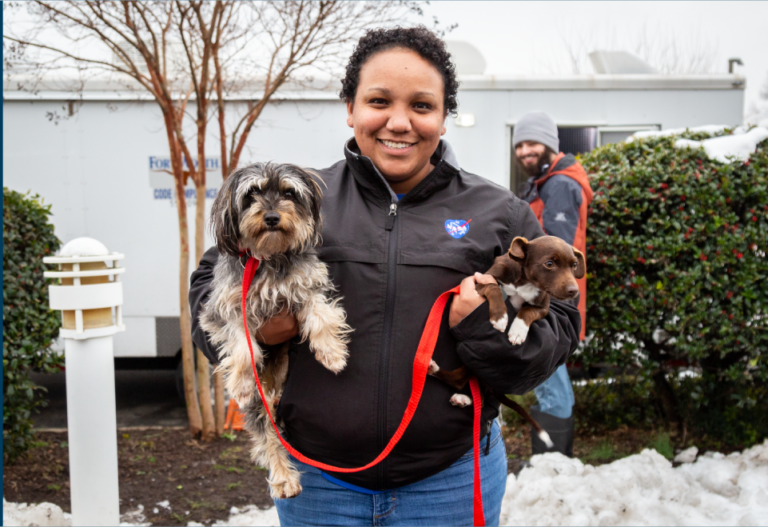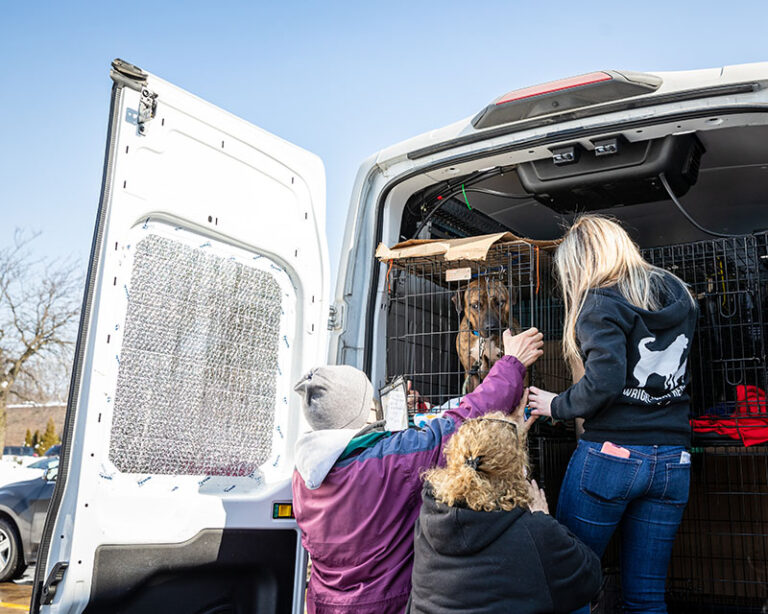Spend a day at an open-intake animal shelter in the U.S., and it probably won’t be long before a call comes in or a person and their pet walk in the door, desperate for low-cost or free veterinary care. And not just for spay or neuter services, which often (and for good reason!) gets the most attention in the animal welfare community. HASS conducted Community Values Surveys (CVS) in eight cities in the U.S. and in every city lack of access to preventative, sick, and emergency veterinary care is among the top 4 resources pet owners have struggled to access or afford in the past three years. Intake data from our HASS pilot shelters confirms that lack of veterinary care has been responsible for almost 13,000 pets being relinquished due to emergency or non-emergency medical issues since 2019. Furthermore, pets.findhelp, a HASS platform that connects people to local resources for pet-related care, reported that “affordable veterinary care” was the second most searched term in 2023.
The inability to afford or access veterinary care is regularly cited as one of the top two reasons for pet relinquishment nationwide. The cost of veterinary care has risen by 10% in the past year, and the lack of veterinarians and veterinary professional staff relative to demand plays a significant role in these increasing costs. That’s why the HASS 2024 policy platform and our policy team are prioritizing supporting legislation across the country that will increase access to veterinary care through creative solutions to the veterinary workforce shortage, innovative cost savings programs for pet parents, and advocating for greater use of telehealth and telemedicine in veterinary care by allowing veterinarians the discretion to establish a virtual veterinary-client-patient-relationship through video appointments.
During this spring legislative session, Florida introduced S.B. 1038, a bill that authorizes a “veterinary professional associate” position in the state. Similarly, Colorado ballot measure Initiative 145 would create a new “veterinary professional associate” position; an effort supported by approximately 65% of voters according to a recent Keating Research Poll. A 2017 study conducted by the AVMA found that 49% of veterinary professionals experience moderate to severe burnout at work. With the shortage of qualified veterinary professionals and services on the rise, our state legislatures are vital in supporting new education credentials that increase career opportunities and growth for non-veterinarian veterinary professionals, keeping qualified veterinary professionals in the field rather than leaving for opportunities outside of veterinary medicine.
Several states have also advanced bills authorizing certain persons, such as animal control officers, to administer rabies vaccinations to certain animals under the indirect supervision of a veterinarian. Typically, rabies vaccines can only be administered by a veterinarian or under the “direct supervision” of a veterinarian, which is generally understood to mean that a veterinarian is readily available and on the premises. In Florida, H.B. 303 defines “indirect supervision” as, “the supervising veterinarian is required to be available for consultation through telecommunications but is not required to be physically present during such consultation.” This is a particularly useful change in law for animal shelters. We know that otherwise adoptable animals are sitting in shelters, unable to go to their fur-ever homes, because shelters across the country have to rely on visiting veterinarians to vaccinate pets. For example, an alarming 2023 survey of California shelters illuminated that more than 300,000 shelter animals didn’t have adequate access to veterinary care for routine, sick, or emergency needs. Almost 25% of shelter respondents stated that they were unable to consistently provide some form of “essential” care, which includes basic vaccination upon intake. More than ¾ of shelter respondents identified this lack of access to veterinary services as a reason for increasing length of stay for shelter animals.
In Washington, D.C., HASS supported B25-0545, legislation which would expand accessibility to pet owners seeking virtual veterinary care. Notably, this law would give veterinarians the discretion to establish a Veterinary Client Patient Relationship (VCPR) through virtual means. The AVMA estimated that in 2020, more than 50 million pets –⅓ of all owned pets in the U.S.–do not see a veterinarian at least annually. Both the current and projected national shortage of veterinarians and outdated regulations, like a requirement for an in-person assessment to establish a veterinary-client-patient-relationship (VCPR) before they can treat animals – even for minor and common issues – contribute to the increasing number of companion animals that don’t see a veterinarian. This is particularly problematic for lower-income and rural pet owners who often face significant financial and logistical obstacles to getting their pets to a clinic and the care they need. Telemedicine and telehealth, including the capacity to establish a VCPR virtually, expand how veterinarians can serve pets and their people and are important components of increasing access to veterinary care for all pet owners. In Colorado, ballot measure Initiative 145 would allow veterinarians licensed in Colorado to “use their discretion in providing animal health care services through audio-visual communication systems to facilitate assessment, diagnosis, or treatment of animals located in Colorado,” including establishing a VCPR. Almost ¾ of voters surveyed during a recent poll indicated that they would vote “yes” on this ballot measure, with 86% indicating support specifically for the allowance of establishing a virtual VCPR. Despite this strong support from Colorado residents, the Colorado legislature has moved forward with H.B. 1048, which would explicitly disallow a virtual VCPR in the state.
In addition to proposed changes to the veterinary profession, we’re also seeing legislation offering creative tax benefits to help pet owners offset the costs of veterinary care. New York and Kansas, among others, introduced bills which would allow pet owners to receive tax credits based on veterinary care expenses. In Kansas, H.B. 2419 would provide pet owners with an income tax credit up to $500 for veterinary expenses paid for up to three animals in their household. In New York, A. 85 provides pet owners a tax credit of 80% of the actual cost of spaying or neutering a pet, up to a maximum credit of $200. Also in New York, A. 387 would provide a tax credit of up to $2,000 on a variety of veterinary services, including checkups, vaccinations, microchip implants, and prescriptions.
For years, animal welfare organizations have cited lack of access to veterinary care as one of the top two reasons for pet relinquishment (lack of access to housing is the other most commonly cited reason). No person or family should have to give up the pet they love because they can’t afford veterinary care and, at HASS, we believe that the types of legislation discussed above and progressive efforts to modernize the veterinary field to better respond to the needs of both owned and shelter pets are a key part of our path towards more accessible and affordable veterinary care and, therefore, healthier pets. We encourage advocates to focus on these positive changes and not outdated and punitive mandatory spay and neuter laws for owned pets or fees and fines for failing to vaccinate a pet, for example, when almost ⅓ of pet owners simply can’t afford it and more than ⅔ of pets living with their families in poverty have never seen a vet at all.
If you’re curious about whether your state has proposed any creative solutions to the lack of access to veterinary care in your community, check out the HASS bill tracker (password: APGLT). And check out these resources for help with covering the cost of veterinary care if you or somebody you know is struggling to pay for veterinary care their pets need:
- Pets.FindHelp.com, a HASS platform
- HASS Government & Policy Tools, developed by HASS working groups
- Waggle
- Harley’s Hope
- Best Friends Animal Society Spay/Neuter Resources Map






